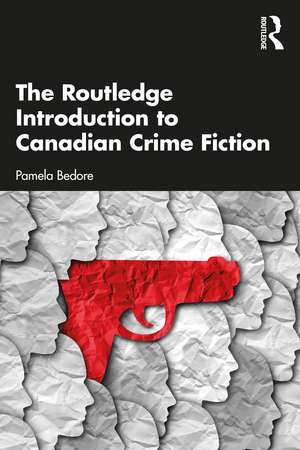The Routledge Introduction to Canadian Crime Fiction: Routledge Introductions to Canadian Literature
Autor Pamela Bedoreen Limba Engleză Paperback – 27 feb 2024
| Toate formatele și edițiile | Preț | Express |
|---|---|---|
| Paperback (1) | 310.75 lei 6-8 săpt. | |
| Taylor & Francis – 27 feb 2024 | 310.75 lei 6-8 săpt. | |
| Hardback (1) | 1008.53 lei 6-8 săpt. | |
| Taylor & Francis – 27 feb 2024 | 1008.53 lei 6-8 săpt. |
Preț: 310.75 lei
Nou
Puncte Express: 466
Preț estimativ în valută:
59.48€ • 64.63$ • 49.100£
59.48€ • 64.63$ • 49.100£
Carte tipărită la comandă
Livrare economică 22 aprilie-06 mai
Preluare comenzi: 021 569.72.76
Specificații
ISBN-13: 9780367645717
ISBN-10: 0367645718
Pagini: 288
Dimensiuni: 152 x 229 x 18 mm
Greutate: 0.39 kg
Ediția:1
Editura: Taylor & Francis
Colecția Routledge
Seria Routledge Introductions to Canadian Literature
Locul publicării:Oxford, United Kingdom
ISBN-10: 0367645718
Pagini: 288
Dimensiuni: 152 x 229 x 18 mm
Greutate: 0.39 kg
Ediția:1
Editura: Taylor & Francis
Colecția Routledge
Seria Routledge Introductions to Canadian Literature
Locul publicării:Oxford, United Kingdom
Public țintă
Postgraduate and Undergraduate AdvancedCuprins
Chapter 1. Negotiations of National Identity in Canadian Crime Fiction
Part 1: Historical Confrontations
Chapter 2. John McFetridge and the Legacy of French/English Tensions
Chapter 3. Giles Blunt and the Canadian North
Chapter 4. Thomas King and the Liminal Indigenous Detective
Chapter 5. Ausma Zehanat Khan and Multiculturalism in Canada
Chapter 6: Linwood Barclay and the American Dream
Part 2: Canadian Genre Play
Chapter 7. The Police Procedural: Registering Change with Peter Robinson’s DCI Banks
Chapter 8. The Amateur Detective: Gail Bowen’s Joanne Kilbourn as Canadian Revisionist
Chapter 9. The Gay Private Eye: Anthony Bidulka’s Russell Quant
Chapter 10. The Legal Thriller: Trauma and Resilience in Pamela Callow’s Kate Lange
Chapter 11. The Postmodern Detective: Literary Detection in Timothy Findley and Carol Shields
Part 3: Futuristic Explorations
Chapter 12. Louise Penny’s Cozy Exploration of Trauma and Temporality in the Anthropocene
Chapter 13. Storytelling, Guilt, and Games in Margaret Atwood’s Postapocalyptic Crime Fiction
Chapter 14. Interpretive Mysteries and Impossible Crimes in Emily St. John Mandel’s Speculative Fiction
Part 1: Historical Confrontations
Chapter 2. John McFetridge and the Legacy of French/English Tensions
Chapter 3. Giles Blunt and the Canadian North
Chapter 4. Thomas King and the Liminal Indigenous Detective
Chapter 5. Ausma Zehanat Khan and Multiculturalism in Canada
Chapter 6: Linwood Barclay and the American Dream
Part 2: Canadian Genre Play
Chapter 7. The Police Procedural: Registering Change with Peter Robinson’s DCI Banks
Chapter 8. The Amateur Detective: Gail Bowen’s Joanne Kilbourn as Canadian Revisionist
Chapter 9. The Gay Private Eye: Anthony Bidulka’s Russell Quant
Chapter 10. The Legal Thriller: Trauma and Resilience in Pamela Callow’s Kate Lange
Chapter 11. The Postmodern Detective: Literary Detection in Timothy Findley and Carol Shields
Part 3: Futuristic Explorations
Chapter 12. Louise Penny’s Cozy Exploration of Trauma and Temporality in the Anthropocene
Chapter 13. Storytelling, Guilt, and Games in Margaret Atwood’s Postapocalyptic Crime Fiction
Chapter 14. Interpretive Mysteries and Impossible Crimes in Emily St. John Mandel’s Speculative Fiction
Notă biografică
Pamela Bedore is Associate Professor of English at the University of Connecticut, where she teaches courses in American Literature and Popular Culture. She holds BA and BEd degrees from Queen’s University, an MA in English from Simon Fraser University, and a PhD in American Literature from the University of Rochester. She has published widely on detective fiction and speculative fiction, including the monograph Dime Novels and the Roots of American Detective Fiction (2013) and the lecture series Great Utopian and Dystopian Works of Literature (The Great Courses, 2017). Pam was the book review editor for Clues: A Journal of Detection for ten years and was recently a visiting scholar at an NEH Summer Institute on Climate Futurism.
Descriere
The Routledge Introduction to Canadian Crime Fiction provides a much-needed investigation into how crime and detection have been, are, and will be represented within Canada’s national literature, with an attention to contemporary popular and literary texts.






